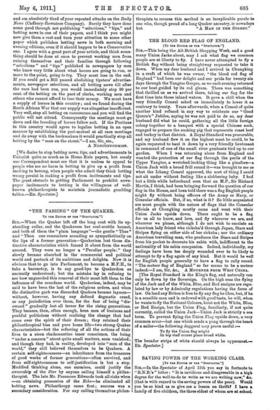"THE PASSING" OF THE QUAKER.
To THZ EDITOR 07 TEl "SPECTATOR."'
SIR,—When the Quaker left off the long coat with its up- standing collar, and the Quakeress her coal-scuttle bonnet, and both of them the " plain language "—the gentle " Thee " and " Thou one remembers sounding so sympathetically on the lips of a former generation—Quakerism lost those dis- tinctive characteristics which fenced it about from the world around. They were no longer a "Peculiar people:" they slowly became absorbed in the commercial and political world and partook of its ambitions and delights. Now it is obvious that to go into Parliament, to become a M.P.H., to take a baronetcy, is to say good-bye to Quakerdom as anciently understood; but the mistake lay in refusing to see how unguarded this removal of their moat left them to the influence of the mundane world. Quakerism, indeed, may be said to have been the last of the religious orders, and when the distinctive garb was discarded Quakers became laymen— without, however, having any defined dogmatic creed, or any jurisdiction over them, for the fear of being "dis- owned " gradually lost all terror for the rising generations. They became, then, often enough, keen men of business and pushful politicians without realising the change that had come over the spirit of their dream ; they retained their philanthropical bias and pure home life—two strong Quaker characteristics—but the referring of all the actions of their lives to a stern rhadamantine inner conscience, the being "under a concern" about quite small matters, soon vanished; and though they had, in reality, developed into "men of the world," they still believed themselves to be Quakers. A certain self-righteousness—an inheritance from the treasures of good works of former generations—often survived, and from self-righteousness to self-justification is but a step. Muddied thinking alone, one surmises, could justify the ownership of the Star by anyone calling himself a philan- thropist. The late Mr. Passmore Edwards took all risks when —on obtaining possession of the Echo—he eliminated all betting news. Philanthropy came first ; success was a secondary consideration. For any calling themselves philan-
thropists to reverse this method is an inexplicable puzzle to one who, though proud of a long Quaker ancestry, is nowadays










































 Previous page
Previous page